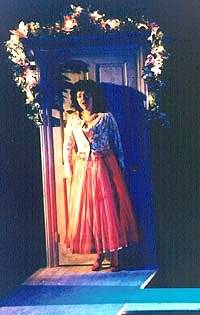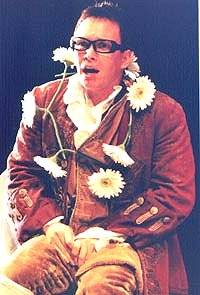Seen&Heard is pleased to present two alternative opinions of The Classical Opera Company's latest production, by Duncan Hadfield and Alexa Woolf. Duncan was disadvantaged by sitting close to the stage, and in one of the crippling seats at this new studio theatre - these are in the majority, and cannot accommodate people with thighs longer than average. I have reviewed elsewhere the important dimension of seating position with regard to sight and sound [Mahler Symphonies Seen & Heard, October 1999]. Comfort, too, plays its part in forming critical judgements! PGW, Editor):
1. A couple of years ago the then newly formed Classical Opera Company made an auspicious debut by stylishly giving Mozart's first-ever opera - Apollo and Hyacinthus, a short drama set in Latin, and staging it in a double-bill alongside another Mozart work, his oratorio Grabmusik. Astonishingly both opera and oratorio were composed when Wolfgang was a mere eleven years old. Some six months later the wunderkind and his ever-ambitious father found themselves trying to make a mark in Vienna, with Leopold Mozart engineering the circumstances by which his son could write his first full-length opera for none other than the Emperor himself: an Italian comedy called La Finta Semplice and based on a play by Goldoni. Envy and intrigue soon set in. None other than Christoph Willibald Gluck seemed to take umbrage at the prospect of his supremacy being usurped by a prepubescent and plans for the opera's Viennese premiere were scuppered.In terms of the 'worth' of La Finta Semplice though, Gluck needn't have worried unduly. There are inklings of what Mozart would go on to achieve in the piece, and a handful of numbers stand out as charmingly memorable but, by and large, even a Mozart fan of my all-consuming enthusiasm might have to concede that the two and a half hour La Finta fails to fire sufficiently. Part of the problem maybe lies with the shenanigans of an unnecessarily complex plot, which attempts to be farcical, but flounders.
Army captain Fracasso and his sergeant Simone have been billeted in the house of two wealthy brothers, Cassandro and Polidoro, and their sister Giacinta. Fracasso is in love with Giacinta, and Simone with her maid, Ninetta, but neither couple can be married without the brothers' consent: enter wildcard Rosina, Fracasso's sister no less, to set various subterfuges and ruses in motion. The young Mozart's problem with all this is not so much his setting of arias, which he manages well enough, but rather, the miles of recitative he has to negotiate simply to get the story across.
For the Classical Opera Company director William Kerley's production is also all too often bogged down by narrative; and, opposed to dispatching of it as swiftly as possible, Kerley instead wrings it for so-called humour via some lame and laboured hamming. Rae Smith's somewhat functional design of three doors linked by catwalks doesn't enhance the mono-dimensional feel much either. The young and hard worked cast of seven tries desperately for something, but much of the effort simply seems dwelt on attempting to keep up a pace, as opposed to enacting or delivering the music.
All can sing just about adequately, but only D'Arcy Bleiker as Cassandro and Tasmin Coombs as Ninetta appeared to have more enduring finesse and vocal presence. In the dry subterranean acoustic of the ROH's new Linbury Studio the period instrument Classical Ensemble foundered somewhat too. Conductor Ian Page shapes the accompaniment stylishly enough but his 22 musicians often lack ensemble and one misses an ambience of sprightliness, a quality from which the enterprise as a whole might have benefited.
Valid, as opposed to valiant.
Writing of this production in The Times, Rodney Milnes is, in my opinion, in a mood to vilify, summing up the whole as "downmarket country-house opera". Though leaving Mozart and the COC aside, I agree with him about one matter whole-heartedly; namely, in his words, "the acute physical discomfort of the Linbury" - and Mr Milnes is perhaps some seven inches shorter than I am. So minimal is the legroom, I emerged barely able to stand or walk! Give me Glyndebourne any day...up- or downmarket.
Duncan Hadfield
 |
 |
Sara Fox as Rosina |
Christopher Saunders as Polidoro |
2. The Classical Opera Company must be thanked for enriching our musical experience with Mozart's astounding early opera, composed in 1768 when he was 12. La Finta Semplice aroused disbelief and professional jealousies at that time, and it still seems miraculous that so young a boy could have gathered all the knowledge, skills and insights necessary to create such a gem.
He started with the bonus of a text by the eminent writer Carlo Goldoni, who dealt with serious matters in the guise of comedy, reflecting contemporary society and the ways people behave. The style, quality and humour of this libretto (previously set by one Salvatore Perillo) must have been just right to spark the prodigious creative impulses of this gifted youngster.
The essence of the complicated story deals with fears (particularly common in adolescence), expectations (reasonable and unreasonable) and acceptance of marriage partnerships, whether achieved easily, or helped along through judicious manipulation by brother and sister conspirators, the Hungarian captain, Fracasso (Wynne Evans) and his sister Rosina (Sarah Fox) who lands the rich landowner. Three pairs will make it through various vicissitudes. They are counterpointed by Polidoro (Christopher Saunders), the odd one out, who would, in theory, like a wife - but he tries too hard, remains locked in childlike unrealities, the victim who gets left behind.
Cassandro (D'Arcy Bleiker) epitomises the need to emerge from ambivalent feelings about the other sex. "Women everywhere" he rails, whilst secretly wanting to become familiar with them. He is vociferous in his antagonism, but we see him secretively snooping around Rosina's belongings, a simple and brilliant way to show us the two sides of one coin.
The need and capacity to engage with the 'other half' is one of life's challenges. The fond belief about self-sufficiency, not needing another, is exemplified by Simone (Richard Strivens) who can feed himself, thank you very much, pulling out of his capacious army pockets bread, sausage, a knife to slice it and a tube of mustard - a deliciously hilarious scene! He later crosses the bridge towards interdependence when he offers his choice tit-bits to a fancy woman, Giacinta (Ebba Wallin), but social order prevails and it is the family maid (Tamsin Coombs) whom he marries in the end.
The charming, effective set by Rae Smith remains essentially the same through the three acts, with two raised platforms spaces, a stage in the foreground just large enough to accommodate all seven characters, plus unique sur/sub-titles, and a 'left over' space back right. They are connected by raised passageways to three garlanded doors, the whole balanced but not symmetrical, just like the actors in this serious comedy of life. Metaphorically, each of them needs to go through a rite of passage, an adjustment, to reach the goal.
The background is black, which, with skilful lighting by Paule Constable, makes the scenes look vivid and immediate. The ground level interstices between the raised floor spaces are black through the first two acts; only during the last act are we allowed to wander beyond the set, beyond the story in our mind, into a memorial-like garden which has magically sprouted, replete with teddy bears and toy rabbits! A tender and poignant reminder that what we are seeing and hearing was/is the wonderful gift of a child, but at what cost to his childhood the countless hours of dedicated labour, and not only those during the six months it took him to compose La Finta Semplice?
This production, with personable young professional singers directed by William Kerley, matched skill with skill, and is in harmony with a youthful work, which should not be under-estimated. The singing was enjoyable, with all the parts well characterised; Sarah Fox as the fake Baroness had vocal problems on the night we went. Ian Page directed the proceedings well and his ensemble sounded well from (comfortable) seats at the back. The Classical Opera Company may be congratulated for putting La Finta Semplice into circulation with thoughtful artistry.
Alexa Woolf
Make up your own minds (if you are not too tall!) by going to one of the further performances of La Finta Semplice on 1, 3 and 4 April at Linbury Studio Theatre, Royal Opera House, Covent Garden and also at Brighton on May 20th.
There are two complete recordings in the current catalogue: Orfeo C085843F (Salzburg/Hager) and Philips 422 528-2PME2 (CPE Bach/Schreier £17.99) PGW

 Return to:
Return to: